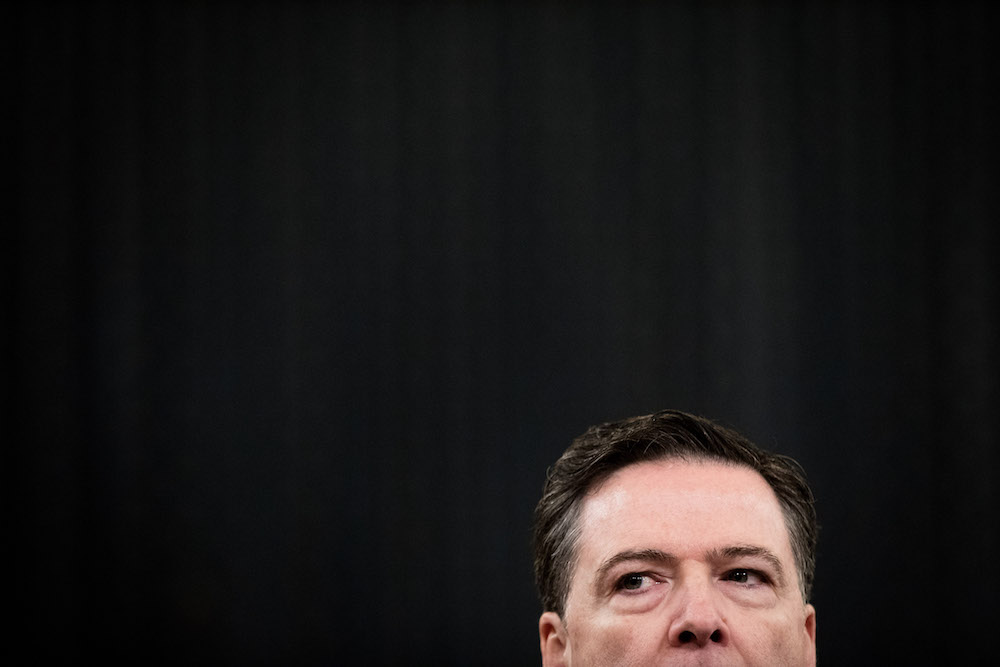Today, FBI director James Comey and NSA director Admiral Michael Rogers appeared before the House Intelligence Committee in a hearing regarding Russia and President Donald Trump‘s allegations that Barack Obama ordered a wiretap of his residence at Trump Tower. Between a lot of long-winded political theater from congresspeople and questions that Comey refused to answer because they pertain to classified information or an open FBI investigation, we did learn a few important things about that zany guy in the White House. A few of the key points:
There is no evidence that the Trump Tower wiretap happened.
Early in the morning of March 4, Trump published a series of tweets accusing Obama of ordering a wiretap on Trump tower during the election. “How low has President Obama gone to tapp my phones during the very sacred election process,” he wrote in one of them. “This is Nixon/Watergate. Bad (or sick) guy!” Trump gave no evidence to support the claim of wiretapping, which he’d apparently gleaned from a specious report on Breitbart News from the day before. The Justice Department set about debunking the claim through informal channels pretty much immediately, with unnamed senior officials telling the New York Times that Comey had privately asserted it was false, but Comey himself hadn’t spoken about it publicly until today. As expected, he emphatically denied that there is any evidence such a wiretap happened. “I have no information that supports those tweets,” Comey said before the committee, adding that a president wouldn’t even be empowered to order a wiretap against a citizen if he wanted to.
Lest the viewers at home believe that Comey is part of a partisan deep-state plot to bring down Trump, Republican Rep. Devin Nunes, the Trump ally who chairs the Intelligence Committee, reiterated that there was no wiretap.
It’s been clear from the beginning that the wiretap didn’t happen–Nunes himself has said it publicly before–but Comey’s assertion of that fact in an on-the-record congressional hearing is meaningful, and it leaves Trump and his supporters without a leg to stand on. Press Secretary Sean Spicer has been jumping through a series of ever-more-elaborate rhetorical hoops recently to distance Trump from the claim without actually acknowledging that Trump misled the American people. Today’s hearing will make it impossible for an ordinary president to keep up the act, though it’s entirely possible that Trump and Spicer will grit their teeth, pretend it never happened, and go on lying.
The FBI is investigating alleged links between Russia and the Trump campaign.
The other big takeaway was Comey’s first public confirmation that the Bureau is in fact conducting a widely-suspected inquiry into alleged ties between Russian officials and Trump’s presidential campaign. Comey noted that the FBI does not generally disclose information about ongoing investigations, but elected to do so now because the Trump-Russia inquiry was deemed as being in the public interest. This comes after the Department of Homeland Security and Office of the Director of National Intelligence issued a joint statement last year expressing their confidence that Russia orchestrated the DNC email hack that was provided to Wikileaks, in an effort to influence the outcome of the election. It also follows the resignation of Michael Flynn as national security advisor to the president after it was revealed that he’d conducted potentially illegal meetings with Russian officials and lied about them to Mike Pence and others in the White House.
The confirmation of the FBI’s investigation is important for multiple reasons. The first and most obvious is that it could lead to further revelations about Trump’s relationship with Russia and the country’s alleged schemes to help him get elected. These revelations might include confirmations or debunkings of the infamous dossier published by BuzzFeed in January–perhaps including, god help us, the existence of the piss tape–and they might also include stuff we haven’t even heard about yet. Comey’s statement is also noteworthy because of the timeline he supplied for the investigation. He said that the FBI launched its investigation in July, meaning, as several reporters have noted, that the Bureau was three months into investigating Trump when Comey released his November letter regarding additional Clinton-related emails found during an unrelated investigation into Anthony Weiner. In other words, when Comey knew both about the additional emails and about Trump’s possible collusion with Russia, he elected to go public with the emails but not with Russia. With Trump in the White House, the reasoning for that decision becomes harder and harder to fathom every day.
Republicans are trying very hard to spin this into a political victory.
Multiple Republican members of the committee elected to focus on the manner in which information about Trump’s alleged Russia ties was provided to the press, and not the substance of the information itself. For Reps. Trey Gowdy and Peter King, this meant haranguing Comey about the idea that leakers and even journalists who publish leaks could and should be criminally prosecuted. “Is there an exception in the law for current or former U.S. officials requesting anonymity?” Gowdy asked Comey. “Is there an exception in the law for reporters who want to break a story?” There’s nothing that Gowdy loves more than grandstanding at a congressional hearing–you might remember him as the main Benghazi guy–but even for him this is ridiculous. Not to mention that Gowdy himself once accidentally released the name of a classified CIA source when engaging in a political swordfight about the Clinton emails.
Rep. Nunes, on the other hand, wanted to know whether Comey would also conduct an investigation of the Clinton campaign, in an imaginary scenario in which the losing candidate was also found to have potentially criminal ties to Russia. Nunes didn’t bother explaining the specifics of this scenario, like how Putin would benefit from playing both sides, or why he would conspire to help a candidate he openly hates in the first place. “If this committee comes to you with information about the Clinton campaign, will you add that to your investigation?” he asked Comey. Comey’s answer to this contextless hypothetical, of course, was yes: “If people bring us info, we will evaluate it,” he said–and the guy’s not exactly a HillaryMan.
Ultimately, these were futile attempts distract from the real story, which is that the FBI director implicitly accused the president of lying about being wiretapped and said that the Bureau is investigating his campaign for evidence of criminal collusion with a foreign power. Comey was tight-lipped about the specifics of the investigation, but we’ll only learn more in the months ahead. And some day, if we are very lucky, maybe the piss tape will come to light.





